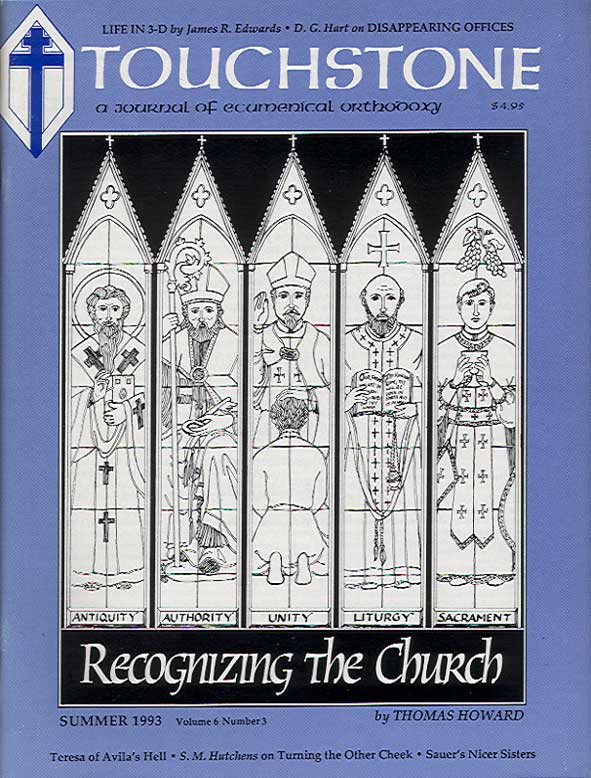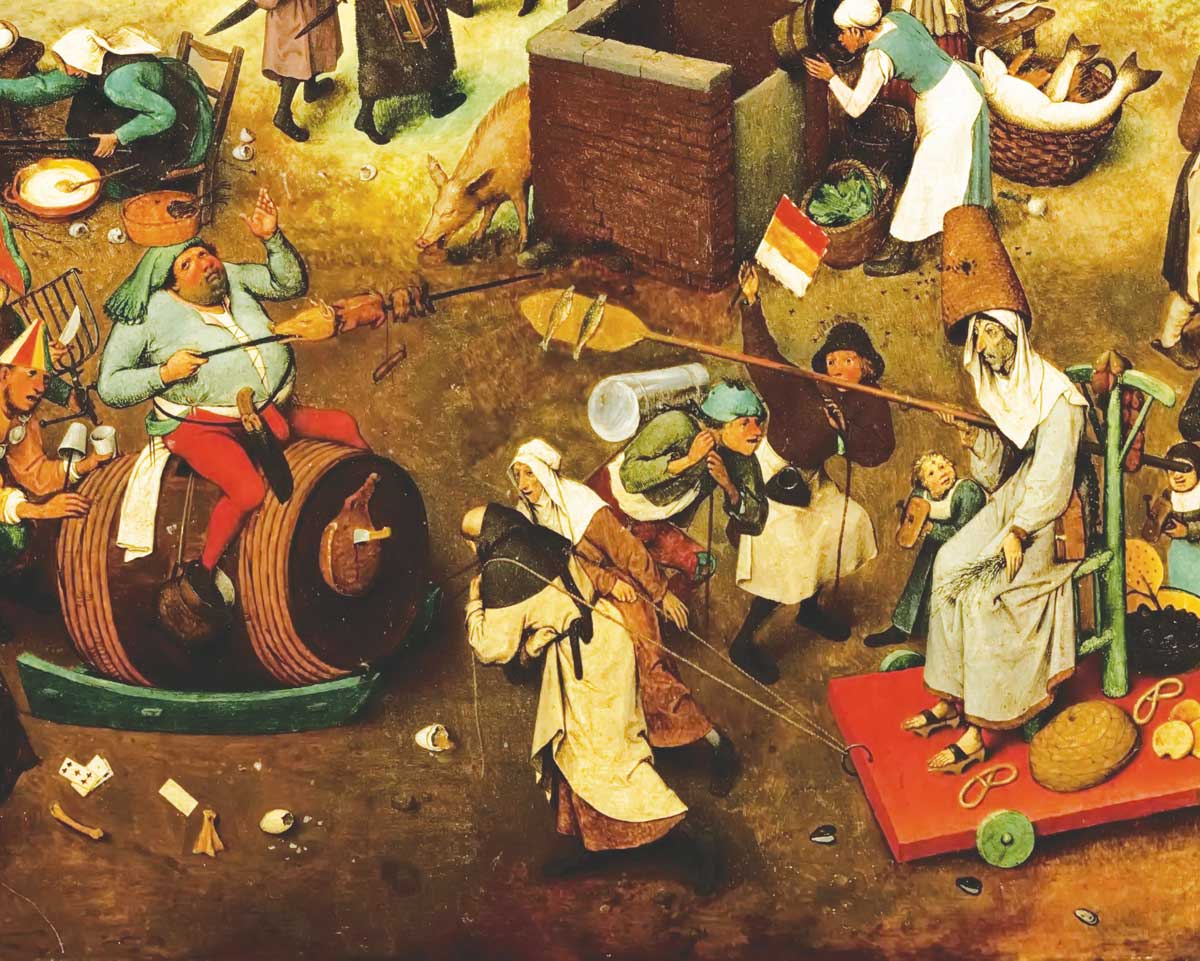The Joy of Conservatism
Often I have to explain to inquirers that Touchstone is a conservative ecumenical journal. For many, the word ecumenical immediately indicates otherwise. “You are either one thing or the other: which is it?” someone might ask. How can you be both ecumenical and orthodox? This is like being a journal of broad narrow-mindedness or inclusive exclusivity—perhaps edited by a liberal conservative or a cheerful curmudgeon. We seem to defy easy stereotyping.
We have this problem, in part, because conservatism usually is caricatured as close-minded, which is nearly the same as defensive or reactionary. The essence of such conservatism to most people is the unwillingness to change. In contract, liberals are open-minded and willing to change. Liberals are trying to dismantle what is obsolete and make room for something better; conservatives stubbornly defend the old ways and try to keep things as they are. Conservatives also appear to be arrogant, trying to impose their way on everyone else because they know better. But are these caricatures accurate?
Recently my daughter, Sharon, a student at an evangelical college and a member of one of the older liturgical churches, was challenged by a classmate: “How can you stand it, doing the same old liturgy that has been around for hundreds of years, when there is so much contemporary worship available? It seems awfully narrow-minded to be confined to the same old thing; you need to be more open-minded.” Sharon, confused about what to think, said to me, “I don’t think I am narrow-minded at all, but what about what my classmate said?”
I knew she was not narrow-minded, but that caricature fit so easily. Since she was committed to keeping to a traditional worship, she couldn’t be open-minded about throwing it aside for something more contemporary. Those who are willing to change over for contemporary worship are obviously open-minded on this issue. But are those who do not wish to change to contemporary worship and wish to practice the same liturgy necessarily narrow-minded? I told her, “Give me a minute, and I am sure that we can turn this accusation on its head.”
“The problem,” I said, “with contemporary worship is not that it is more open but that it is too closed.” After all, it is modeled on what is culturally fashionable to Americans in 1993. In twenty years it will be dated and unappreciated by the next generation. There will be a new contemporary worship for 2003, but some will still be doing the worship style of 1993, just as today some are stuck in the worship styles of the 1970s. Thus we end up with a cafeteria of dated worship “styles,” cut off from each other because they reflect changing cultural phases. Designing a worship service for contemporary tastes, while appearing open-minded, can actually be an exercise in narrow-mindedness, especially when it is cut off from the historical tradition of the Church.
Worship based on the ancient liturgies of the Church allows the traditionalist Christian, if she has the right spirit, to be infinitely more open-minded about worship than her contemporary-minded friends. This is because the liturgy of the Church was shaped not by one generation, but by many generations. She can even do one better: she can be more—to use liberal jargon—multi-cultural and pluralistic than they, since the liturgy was shaped not only in one particular culture, but in many cultures—by Old Testament Jews, Jewish Christians, other Semites, Greeks, Romans, North Africans, Slavs, and (in our culture) by English-speaking saints, and on and on.
Granted, some music may change, some practices may be added, some modified, but all in a way internally consistent with the shared experience of the Church and not in response to cultural demands or fads. Some music for the ancient texts of the Church is medieval, and some was written in the last several hundred years, and some was written in the last ten years. The texts themselves have come from different sources over a wide geographic and chronological range. The liturgy of the Church is infinitely more multi-cultural than anything contemporary possibly could be.
“However,” I warned Sharon, “there is a serious difference between being a true conservative and being one by temperament only.” The latter is naturally cautious, perhaps even afraid of change or just lacking the energy to change; perhaps he is just afraid of others’ opinions. That is not what I meant. True conservatism seeks to conserve the liturgy not because of fear of change but simply because it is rich, multi-layered, diverse in the sense that it has been the work and practice of a great diversity of the faithful. It is good and worth preserving. The true conservative holds the tradition for the sheer enjoyment of its rich goodness. This good deposit itself is not narrow, but like the Bible, it is made up of a multiplicity of witnesses to the revelation of God, from Moses, David, Deborah, Solomon, Isaiah, the corporate witness of the community of Israel, and the communities of the early Church, from the Middle East, Europe, North Africa and Asia.
Moreover, it is not the conservative who is arrogant, staunchly defending the traditional. Granted, most fallen humans are naturally proud, whether they are orthodox and belong to the right group or are liberal and see better than small-minded conservatives. Both, like the Pharisee, thank God that they are not like the other.
But as a conservative, I told Sharon, I can take no personal pride in orthodoxy—it is not something of my own making. Indeed, I am grateful not to be in the unenviable position of having to defend the New Testament writings and Creeds as something I just made up. This is one reason why conservatism has a cheerful side to it—I am relieved of having to defend this tradition as a personal creation. We conservatives simply have been given something by those who were followers of Christ, and we feel the weight of it. Those who fight it find the yoke to be a burden; those who embrace it find it liberating and discover the “commandments are not burdensome.”
Those who criticize conservatives must understand that we are loath to change what Peter or Paul wrote, not because we are stubborn by nature but because we have been told we have to be stubborn about certain things. If it were up to me, Paul would not have said certain things, Peter would have written a different letter, and John’s Gospel might have a different tone. But it wasn’t left up to me, and it hasn’t been left up to anyone else that I know of.
James M. Kushiner is the Director of Publications for The Fellowship of St. James and the former Executive Editor of Touchstone.
subscription options
Order
Print/Online Subscription

Get six issues (one year) of Touchstone PLUS full online access including pdf downloads for only $39.95. That's only $3.34 per month!
Order
Online Only
Subscription

Get a one-year full-access subscription to the Touchstone online archives for only $19.95. That's only $1.66 per month!
bulk subscriptions
Order Touchstone subscriptions in bulk and save $10 per sub! Each subscription includes 6 issues of Touchstone plus full online access to touchstonemag.com—including archives, videos, and pdf downloads of recent issues for only $29.95 each! Great for churches or study groups.
Transactions will be processed on a secure server.
more from the online archives
calling all readers
Please Donate
"There are magazines worth reading but few worth saving . . . Touchstone is just such a magazine."
—Alice von Hildebrand
"Here we do not concede one square millimeter of territory to falsehood, folly, contemporary sentimentality, or fashion. We speak the truth, and let God be our judge. . . . Touchstone is the one committedly Christian conservative journal."
—Anthony Esolen, Touchstone senior editor









